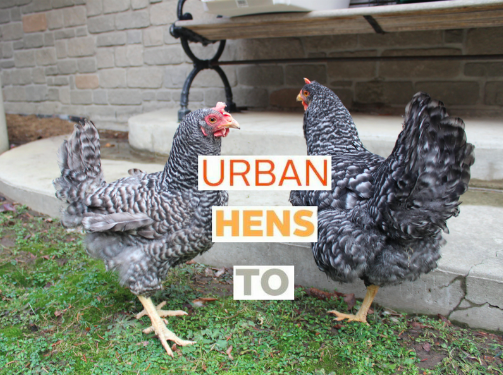 The City of Toronto has launched an UrbanHensTO Pilot Program, allowing residents in four wards across the city to register to have up to 4 hens on their residential property. The pilot will run for 3 years, until March 2, 2021.
The City of Toronto has launched an UrbanHensTO Pilot Program, allowing residents in four wards across the city to register to have up to 4 hens on their residential property. The pilot will run for 3 years, until March 2, 2021.
“Cities need to enable the widest possible range of urban food production options to meet residents’ need for local, fresh food and regain their sense of control over local food systems,” shares Rhonda Teitel-Payne, Co-Coordinator with Toronto Urban Growers. “This pilot can alleviate concerns and misconceptions about a potentially important food access strategy. We hope that, in addition to backyard hens, the pilot will open up opportunities to explore ways for low-income tenants and community gardeners to also benefit from raising chickens.”
The Toronto Food Policy Council and staff from Toronto Animal Services have already held two workshops, hosted by local councillors, to help potential hen owners learn more about the pilot requirements, as well as basic care for hens, how to prevent and detect disease, best practices for feeding and care for hens, and coop designs.
The pilot is running in Ward 5 (Etobicoke-Lakeshore), Ward 13 (Parkdale-High Park), Ward 21 (St. Paul’s), and Ward 32 (Beaches-East York).
The two upcoming workshops are taking place in Ward 5 at the Etobicoke Civic Centre on Saturday, April 14, from 10 a.m. to 12 noon; and in Ward 32 at the Danforth Mennonite Church on Saturday, April 21, at the same time.
Ward 13 and Ward 21 workshops have already taken place.
Lorraine Johnson and Adam Dirks, local chicken champions who are running the above workshops, wrote an op-ed for the Toronto Star last month:
“There’s a town in Belgium and another one in France that offer residents free backyard chickens — not because people are clamouring for better omelettes or happier hens, but because these towns are trying to manage their kitchen waste in a way that doesn’t overburden already bulging garbage dumps. These towns recognize that chickens are compact, two-legged, live composters that turn food scraps into rich, nutrient-packed garden fertilizer.”
If you are interested in more information, including eligibility requirements, visit the City of Toronto’s website here.
